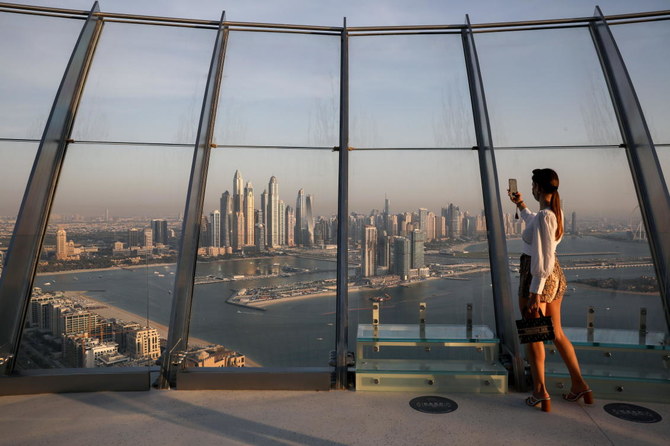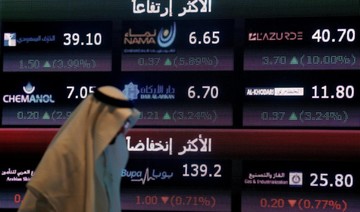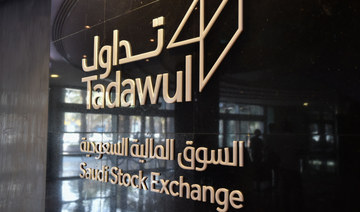DUBAI: Dubai’s stock market is set for another delisting, raising a question mark over the future of one of the Gulf’s major exchanges, which was launched two decades ago.
A $595 million bid to take DAMAC Properties private by the firm’s founder Hussain Sajwani is the latest blow to the exchange, even as the Gulf city state’s property market showed signs of life in the first quarter.
“It is not that Dubai is becoming less attractive. Alternatives are becoming more attractive,” Khaled Abdel Majeed, founder at London-based Mena Capital LLP, told Reuters.
Majeed said Dubai needs to work harder to attract listings amid growing competition from within the Gulf region such as Abu Dhabi and Saudi Arabia where Tadawul, the region’s biggest exchange based on market value, wants to become a regional hub.
While the value of traded stocks in Dubai was once higher than rival Abu Dhabi, this changed in 2019 and ADX now has a more than four times higher average daily traded value.
ADX has also seen gains after its owner, ADQ, launched a market maker last year that tapped into a fund to boost liquidity on the bourse.
“It’s disappointing from a market point of view that you have companies de-listing ... at a time when we think the market needs added depth, more companies, which has not been happening since 2014-2015,” Mohammed Ali Yasin, chief strategy officer at Al Dhabi Capital in Abu Dhabi, said of the Dubai stock market.
Since the start of 2020, two prominent Dubai companies have de-listed from the Dubai Financial Market (DFM) and Nasdaq Dubai: Dubai parks operator DXB Entertainments and Dubai ports operator DP World.
And shares in Arabtec, once a high-flying Dubai construction company, were suspended in September after its shareholders voted to dissolve company.
Emaar Malls, operator and owner of the world’s largest shopping center, in March said it planned to offer to buy out minority shareholders and merge with Emaar Properties.
And Dubai real estate fund Emirates REIT, which is listed on the Nasdaq Dubai exchange, said in July it was considering de-listing.
Where Abu Dhabi is boosting liquidity through planned new listings and consolidation of assets of state holding company ADQ, Dubai appears to have become more tolerant of delistings, a Gulf M&A banker told Reuters.
Analysts say the move to de-list spares companies having to face scrutiny from investors, along with the running costs of a listing and disclosure and transparency requirements.
“If someone wants to take (their company) private; this is the time,” the M&A banker said.
Asked what steps, if any, it was taking to ensure that listed companies remained on the exchange and that it attracted new listings, the DFM declined to comment
The problem for listed Dubai real estate companies is that they are trading at a discount to the average price to earnings of the wider market, at around 8 times earnings, while the market is trading at around 20 times that.
“For DAMAC, I’m sure that the strategic investor, Hussain Sajwani, understands that the intrinsic value of the company is higher than the share price, Tariq Qaqish, chief executive of Salt Fund Placement in Dubai, said.
The two years leading to the COVID-19 pandemic exposed the vulnerabilities of Dubai’s homebuilders and property companies, said Samer Haydar, director of corporate ratings at Fitch.
And despite signs of recovery, many are “still facing the aftermath of the pandemic in terms of negative working capital, rising leverage, weak liquidity and overall un-absorbed supply in the market,” Haydar said.
DAMAC delisting plan piles pressure on shrinking Dubai market
https://arab.news/wvc3z
DAMAC delisting plan piles pressure on shrinking Dubai market

- While the value of traded stocks in Dubai was once higher than rival Abu Dhabi, this changed in 2019 and ADX now has a more than four times higher average daily traded value
Open Forum Riyadh to discuss digital currency, AI, and mental health

- The event will run in parallel to the WEF’s Special Meeting on Global Collaboration
LONDON: The Open Forum Riyadh — a series of public sessions taking place in the Saudi capital on Sunday and Monday — will “spotlight global challenges and opportunities,” according to the organizers.
The event, a collaboration between the World Economic Forum and the Saudi Ministry of Economy and Planning, will run in parallel to the WEF’s Special Meeting on Global Collaboration, Growth and Energy for Development, taking place in Riyadh on April 28 and 29.
“Under Saudi Vision 2030, Riyadh has become a global capital for thought leadership, action and solutions, fostering the exchange of knowledge and innovative ideas,” Faisal F. Alibrahim, Saudi minister of economy and planning, said in a press release, adding that this year’s Open Forum being hosted in Riyadh “is a testament to the city’s growing influence and role on the international stage.”
The forum is open to the public and “aims to facilitate dialogue between thought leaders and the broader public on a range of topics, including environmental challenges, mental health, digital currencies, artificial intelligence, the role of the arts in society, modern-day entrepreneurship, and smart cities,” according to a statement.
The agenda includes sessions addressing the impact of digital currencies in the Middle East, the role of culture in public diplomacy, urban development for smart cities, and actions to enhance mental wellbeing worldwide.
The annual Open Forum was established in 2003 with the goal of enabling a broader audience to participate in the activities of the WEF, and has been hosted in several different countries, including Cambodia, India, Jordan and Vietnam.
The panels will feature government officials, artists, civil-society leaders, entrepreneurs, and CEOs of multinationals.
This year’s speakers include Yazeed A. Al-Humied, deputy governor and head of MENA investments at the Saudi Pubic Investment Fund; Princess Reema Bandar Al-Saud, Saudi Arabia’s ambassador to the US; and Princess Beatrice, founder of the Big Change Charitable Trust and a member of the British royal family.
Michele Mischler, head of Swiss public affairs and sustainability at the WEF, said in a press release that the participation of the public in Open Forum sessions “fosters diverse perspectives, enriches global dialogue, and empowers collective solutions for a more inclusive and sustainable future.”
Meituan looks to hire in Saudi Arabia, indicating food delivery expansion

SHANGHAI: Chinese food delivery giant Meituan is seeking to hire staff for at least eight positions based in Riyadh, in a sign it may be looking to Saudi Arabia to further its global expansion ambitions, according to Reuters.
The jobs ads, which is hiring for KeeTa, the brand name Meituan uses for its food delivery operations in Hong Kong, is seeking candidates with expertise in business development, user acquisition, and customer retention, according to posts seen by Reuters on Linkedin and on Middle Eastern jobs site Bayt.com.
Meituan did not immediately respond to a request for comment by Reuters on its plans for Saudi expansion.
Bloomberg reported earlier on Friday that the Beijing-based firm would make its Middle East debut with Riyadh as the first stop.
Since expanding to Hong Kong in May 2023, Meituan’s first foray outside of mainland China, speculation has persisted that its overseas march would continue as the firm searches for growth opportunities, with the Middle East rumored since last year to be one area of possible expansion.
“We are actively evaluating opportunities in other markets,“ Meituan CEO Wang Xing said during a post-earnings call with analysts last month.
“We have the tech know-how and operational know-how, so we are quietly confident we can enter a new market and find an approach that works for consumers there.”
IMF opens first MENA office in Riyadh

RIYADH: The International Monetary Fund has opened its first office the Middle East and North Africa region in Riyadh.
The office was launched during the Joint Regional Conference on Industrial Policy for Diversification, jointly organized by the IMF and the Ministry of Finance, on April 24.
The new office aims to strengthen capacity building, regional surveillance, and outreach to foster stability, growth, and regional integration, thereby promoting partnerships in the Middle East and beyond, according to the Saudi Press Agency.
Additionally, the office will facilitate closer collaboration between the IMF and regional institutions, governments, and other stakeholders, the SPA report noted, adding that the IMF expressed its appreciation to Saudi Arabia for its financial contribution aimed at enhancing capacity development in its member countries, including fragile states.
Abdoul Aziz Wane, a seasoned IMF director with an extensive understanding of the institution and a broad network of policymakers and academics worldwide, will serve as the first director of the Riyadh office.
Saudi minister to deliver keynote speech at Automechanika Riyadh conference

RIYADH: Saudi Arabia’s Deputy Minister of Investment Transaction Saleh Al-Khabti is set to deliver the keynote speech at a global automotive aftermarket industry conference in Riyadh.
Set to be held from April 30 April to May 2 in the Saudi capital’s International Convention and Exhibition Center, Automechanika Riyadh will welcome more than 340 exhibitors from over 25 countries.
Al-Khabti will make the marquee address on the first day of the event, which will also see participation from Aftab Ahmed, chief advisor for the Automotive Cluster at the National Industrial Development Centre, Ministry of Industry and Mineral Resources.
Saudi Arabia’s automotive sector is undergoing a transformation, with the Kingdom’s Public Investment Fund becoming the major shareholder in US-based electric vehicle manufacturer Lucid, and also striking a deal with Hyundai to collaborate on the construction of a $500 million-manufacturing facility.
Alongside this, Saudi Arabia’s Crown Prince Mohammed bin Salman launched the Kingdom’s first electric vehicle brand in November 2022.
Commenting on the upcoming trade show, Bilal Al-Barmawi, CEO and founder of 1st Arabia Trade Shows & Conferences, said: “It is a great honor for Automechanika Riyadh to be held under the patronage of the Saudi Arabian Ministry of Investment, and we’re grateful for their continued support as the event goes from strength-to-strength.
“The insights and support we’ve already received have been invaluable, and we look forward to continuing this relationship throughout the event and beyond.”
This edition of Automechanika Riyadh will feature seven product focus areas, including parts and components, tyres and batteries, and oils and lubricants.
Accessories and customizing, diagnostics and repairs, and body and paint will also be discussed, as well as care and wash.
Aly Hefny, show manager for Automechanika Riyadh, Messe Frankfurt Middle East, said: “The caliber of speakers confirmed to take part at Automechanika Riyadh is a testament to the event’s growth and prominence within the regional automotive market.
“We have developed a show that goes beyond the norm by providing a platform that supports knowledge sharing and networking while promoting the opportunity to engage with key industry experts and hear the latest developments, trends and innovations changing the dynamics of the automotive sector.”
Aramco-backed S-Oil expects Q2 refining margins to remain steady then trend upward

SEOUL: South Korea’s S-Oil forecast on Friday that second-quarter refining margins will be steady, supported by regular maintenance in the region, then trend upward in tandem with higher demand as the summer season gets underway, according to Reuters.
Over the January-March period, the refiner said it operated the crude distillation units at its 669,000-barrel-per-day oil refinery in the southeastern city of Ulsan at 91.9 percent of capacity, compared with 94 percent in October-December.
S-Oil, whose main shareholder is Saudi Aramco, plans to shut its No. 1 crude distillation unit sometime this year for maintenance, the company said in an earnings presentation, without specifying the time.


















